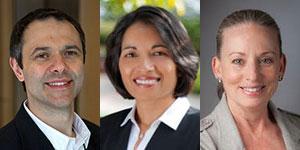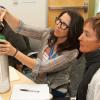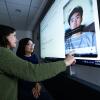
Preparing Health Care’s New Leaders
In an ideal future, the US health care system won’t be a riot of fragmentation, skyrocketing costs and widespread concerns about access to quality care.
Leaders from a range of care professions will work together to pioneer changes that improve health care outcomes for everyone in America’s huge and diverse population. These changes will take place at all levels, from the local hospital unit to the national policy stage.
This vision for a 21st-century world of affordable, accessible quality care is described in the landmark 2010 Institute of Medicine report, The Future of Nursing: Leading Change, Advancing Health. It’s certainly a future that faculty at UC San Francisco School of Nursing hope to advance as they collaborate with faculty at the three other UCSF schools – Dentistry, Medicine and Pharmacy – to launch a new and innovative online master’s degree program in health care leadership.
Scheduled to begin in January 2014, the Master of Science in Healthcare Administration and Interprofessional Leadership (MS-HAIL) program entails several features that make it unique in higher education, says Scott Reeves, director of UCSF’s Center for Innovation in Interprofessional Education and professor in the Department of Social and Behavioral Sciences in the School of Nursing. He is also editor-in-chief of the Journal of Interprofessional Care.
First, the MS-HAIL program welcomes students from a range of disciplines: medicine, nursing, dentistry, pharmacy, social work and other professions. The program is designed for early- to mid-career professionals and will admit 80 students in its first year.
“What is new and exciting about this program is that it helps meet the needs for interprofessional leadership training for individuals who are committed to shaping health care systems of the future,” says physician Sunita Mutha, MS-HAIL program co-director and interim director of the UCSF Center for the Health Professions.
Second, it puts most of the four quarters of coursework online, so that students can earn a master’s degree from UCSF but don’t have to quit their jobs and relocate to the Bay Area to participate. Students will come to UCSF for two on-campus residencies – described as “long weekends” – where they can enjoy one-on-one interactions and networking opportunities with faculty and other students.
 Scott Reeves, Sunita Mutha, Mary Louise Fleming “Imagine commuting from work to home, on Amtrak or on the Long Island Rail Road, and being able to listen to lectures, participate in discussions with classmates or meet and communicate with faculty,” says Mary Louise Fleming, the MS-HAIL program director, who led the effort to create the program. She is also the School of Nursing’s vice chair for administration and the Department of Community Health Systems’ academic coordinator.
Scott Reeves, Sunita Mutha, Mary Louise Fleming “Imagine commuting from work to home, on Amtrak or on the Long Island Rail Road, and being able to listen to lectures, participate in discussions with classmates or meet and communicate with faculty,” says Mary Louise Fleming, the MS-HAIL program director, who led the effort to create the program. She is also the School of Nursing’s vice chair for administration and the Department of Community Health Systems’ academic coordinator.
“When students have the opportunity to remain in their jobs, they can continue to build their careers,” she adds. “They can also apply new knowledge and skills to contribute to their organization’s mission to meet the ‘triple aims’ driving health care today: the simultaneous pursuit of better care for individuals, better health for populations and lower per capita costs.”
The curriculum provides training in health systems research and data management and covers such topics as organizational complexity, leadership, health care policy and economics, business practices and management of social and human capital. The students complete the program with a capstone project in which they develop a plan for improving the delivery of care and services in their workplaces.
In addition to aligning with Chancellor Susan Desmond-Hellmann’s support for interprofessional and online learning, the program serves UCSF’s mission of increasing the numbers of professionals prepared to lead changes in health care.
“Given the societal changes we are currently witnessing – for example, the [increasing number] of older patients with complex chronic illnesses – the need for collaboration is even more urgent,” Reeves says. “The implementation of the Affordable Care Act will also include millions of extra patients into the health care system. This means that health care professions will need to collaborate more effectively to meet these new demands.”



